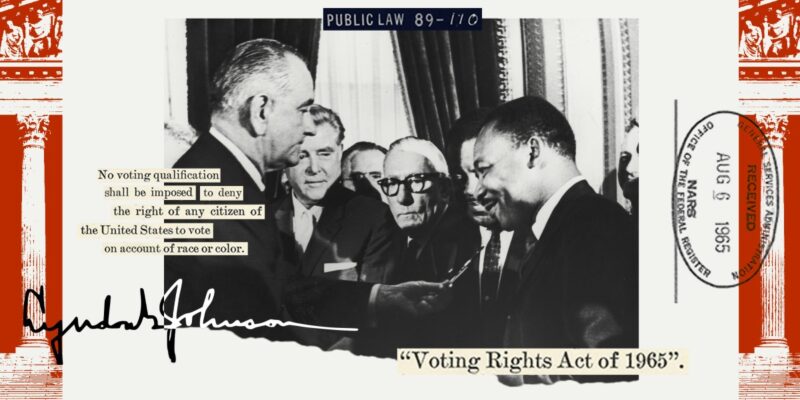
“Today is a triumph for freedom as huge as any victory that has ever been won on any battlefield,” President Lyndon Johnson declared 59 years ago today, as he signed the Voting Rights Act into law at the US Capitol.
The landmark civil rights law transformed American politics, enfranchising millions of voters of color, but as it nears 60-years-old, the Voting Rights Act is under attack from every angle by a conservative-dominated judiciary.
The most serious blow came from the Supreme Court in the 2013 decision Shelby County v. Holder, which ruled that states with a long history of voting discrimination no longer needed to approve their election changes with the federal government. Chief Justice John Roberts wrote in his majority opinion that “things have changed dramatically” in the South, but since the ruling nearly 100 restrictive voting laws have been passed in at least 29 states, according to the Brennan Center for Justice. As a result of the Shelby decision and a slew of new anti-voting measures passed by Republicans in the wake of Donald Trump’s attempt to overturn the 2020 election, voters in almost half the country will face new voting restrictions at the polls in 2024.
In the decade since Shelby, Trump appointees on the nation’s lower courts have taken a wrecking ball to what remains of the VRA.
On Thursday, the ultra-conservative 5th Circuit Court of Appeals overruled two previous court decisions and reinstated a county commissioners’ map in Galveston, Texas, that eliminated the only majority-minority district, ousting the lone Black and minority commissioner. In a 12-6 decision, with all of the Republican-appointed judges in the majority, the appeals court overturned its own precedent dating back to 1988, ruling that minority groups who form a combined majority, such as Black and Hispanic voters in the Galveston area, are not protected under the VRA. That will make it much tougher to secure representation for communities of color, since different minority groups often combine to form a majority in an increasingly diversifying country. “Today, the majority finally dismantled the effectiveness of the Voting Rights Act in this circuit,” Judge Dana Douglas wrote in a dissent.
That’s just one example of how Republican-appointees to the federal judiciary, emboldened by Supreme Court rulings curbing voting rights, are going after the VRA.
In November 2023, a three-judge panel on the 8th Circuit Court of Appeals, which covers seven states in the Midwest and Great Plains, ruled that private plaintiffs could not bring lawsuits to enforce Section 2 of the VRA, the key remaining provision of the law, which prohibits voting practices and procedures that discriminate against voters of color. As I reported for Mother Jones, that ruling, if adopted nationwide, would amount to a near-fatal strike against the VRA:
The opinion said that only the US Attorney General could bring lawsuits to enforce Section 2, but the vast majority of such cases are brought by private plaintiffs, typically individual voters represented by voting rights groups. As Judge Lavenski Smith, an appointee of George W. Bush who is the only Black judge on the 8th Circuit, noted in his dissent, of the 182 successful Section 2 cases over the past 40 years, only 15 were brought solely by the attorney general. If voting rights litigation were dependent on the Justice Department, it would slow to a trickle—or, under a hostile administration, to a halt.
Just days after the 8th Circuit opinion, another conservative appellate court further weakened the power of the VRA. Judge Lisa Branch of the 11th Circuit, a Trump appointee, overruled a lower court opinion invalidating the structure of Georgia’s Public Service Commission, which regulates public utilities and has had only two Black members in over 100 years, because it violated “general principles of federalism.” The decision could allow Georgia and other Southern states to use voting systems that have repeatedly been found to dilute the power of communities of color.
Against the backdrop of these escalating attacks on voting rights, Democrats narrowly failed to pass legislation restoring the power of the VRA and protecting the right to vote nationwide during Biden’s presidency. But they’ve committed to resurrecting the bills should they win control of Congress and the presidency in November.
“We who believe in the sacred freedom to vote, will finally pass the Freedom to Vote Act and the John Lewis Voting Rights Advancement Act,” Democratic nominee Kamala Harris said while campaigning in Georgia last week.
When he signed the VRA, Lyndon Johnson called the right to vote “the most powerful instrument ever devised by man for breaking down injustice.” The very success of the law has convinced its opponents of the urgent need to do away with it, once and for all.















